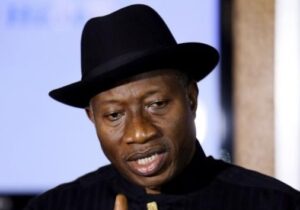Goodluck Jonathan: Reasons Ethnic Loyalty Is Holding Nigeria Back from True Unity and Progress
Goodluck Jonathan: Reasons Ethnic Loyalty Is Holding Nigeria Back from True Unity and Progress

Former Nigerian President, Goodluck Jonathan, has expressed concerns that Nigerians often show greater loyalty to their ethnic groups than to the country as a whole. He believes this deep-rooted division has hindered the nation’s progress and calls for stronger unity.
Speaking at an event in Effurun, Delta State, Jonathan emphasized the crucial role of leadership in fostering national cohesion, urging leaders at all levels to prioritize policies and initiatives that encourage unity rather than seeking immediate praise.
Jonathan highlighted that members of the Nigerian National Assembly should view themselves as representatives of the entire nation, not just their individual states or ethnic groups. “As a lawmaker in the National Assembly, whether in the Senate or House of Representatives, your responsibility is to represent the entire nation, not just your state,” he said.
He pointed out that Nigeria, like many countries with diverse ethnic groups, has yet to fully embrace the concept of national unity, even after more than a century since its amalgamation. “Despite our diverse geography and ecological variety, Nigerians have struggled to recognize the value of unity,” Jonathan noted, adding that the divisions along ethnic and regional lines continue to impede the country’s growth.
The former president observed that the loyalty to ethnic groups is so entrenched that it often trumps national identity. “Nigeria remains a collection of smaller ethnic groups, each focused on its own interests. These divisions have only intensified over time,” he explained.
He also referenced other countries with multiple nationalities that have successfully united, suggesting that Nigeria could learn from their experiences. However, Jonathan stressed that until the country addresses its ethnic divides, meaningful development will remain out of reach.
The ex-president further discussed the challenge of balancing ethnic interests in governance, particularly when appointing ministers and heads of government agencies. He acknowledged that while appointing one minister per state is straightforward, selecting heads of parastatals often results in accusations of favoritism or nepotism. “This is why leadership must focus on national unity over short-term gains,” Jonathan concluded.
TRENDING SONGS
 NPMA Appeals to Nigerian Government for Compensation After Lagos Market Fire
NPMA Appeals to Nigerian Government for Compensation After Lagos Market Fire
 Rest Every Four Hours, FRSC Issues Safety Guide for Fasting Motorists
Rest Every Four Hours, FRSC Issues Safety Guide for Fasting Motorists
 NNPC Boss Ojulari Bags UK Energy Institute Fellowship
NNPC Boss Ojulari Bags UK Energy Institute Fellowship
 Shock in Anambra: Bride Disappears Moments Before Wedding
Shock in Anambra: Bride Disappears Moments Before Wedding
 Nigerian Woman Returns ₦330 Million Accidentally Credited to Her Account
Nigerian Woman Returns ₦330 Million Accidentally Credited to Her Account
 APC Don Reach Morocco?’ VeryDarkMan Reacts to Seyi Tinubu Poster
APC Don Reach Morocco?’ VeryDarkMan Reacts to Seyi Tinubu Poster
 Bride Breaks Down in Tears as Wedding Meals Were Kept Secretly While Guests Go Home Hungry
Bride Breaks Down in Tears as Wedding Meals Were Kept Secretly While Guests Go Home Hungry
 Odogwu by Day, Robber by Night: How Marriage Joy Turned Into Tragedy
Odogwu by Day, Robber by Night: How Marriage Joy Turned Into Tragedy
 Nigerian Officials Allegedly Pocket N4–6B Weekly Through Smuggling Cartels at Seme–Badagry Border
Nigerian Officials Allegedly Pocket N4–6B Weekly Through Smuggling Cartels at Seme–Badagry Border
 Ahmad Yerima: Naval Officer to Face No Sanctions After Clash with Wike – Matawalle
Ahmad Yerima: Naval Officer to Face No Sanctions After Clash with Wike – Matawalle
Share this post with your friends on ![]()













